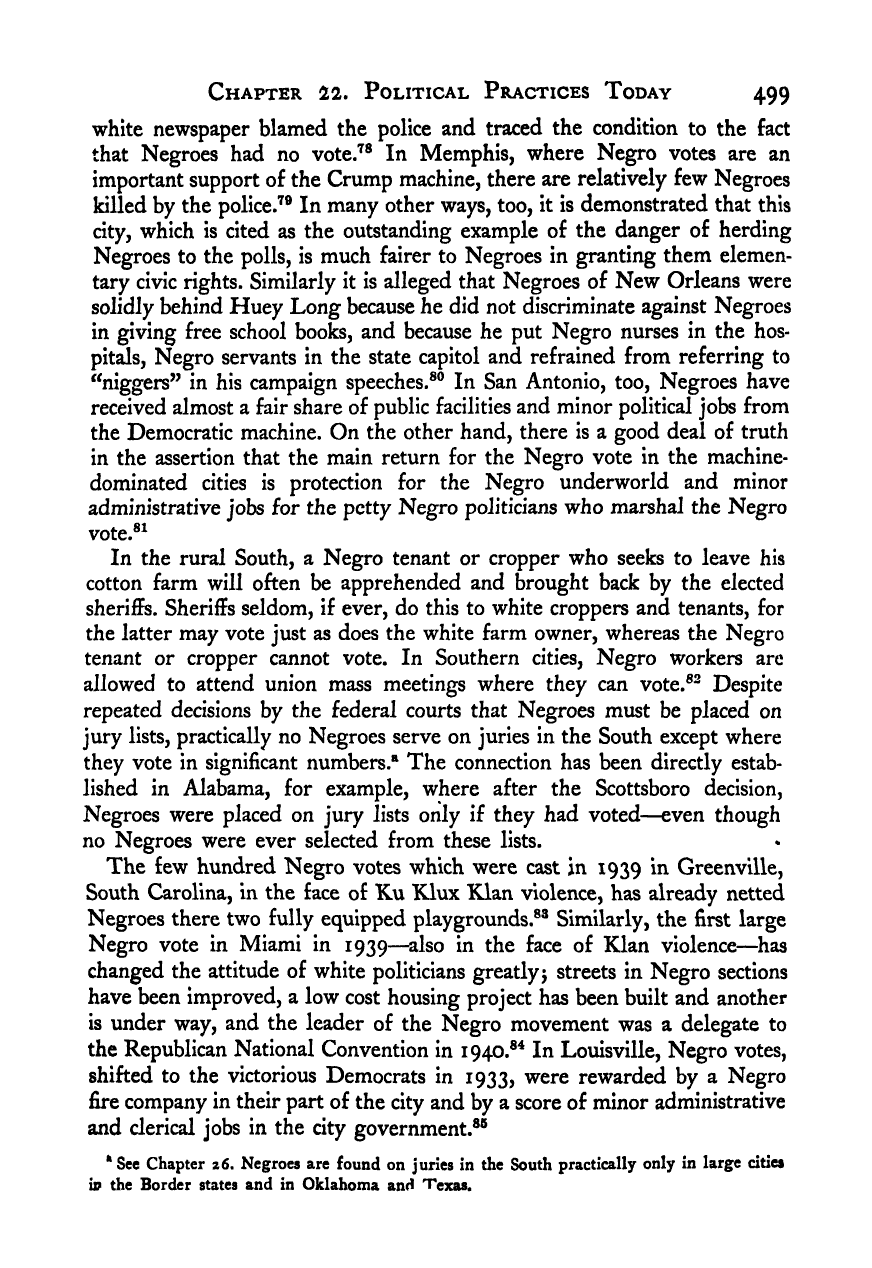Note: Gunnar Myrdal died in 1987, less than 70 years ago. Therefore, this work is protected by copyright, restricting your legal rights to reproduce it. However, you are welcome to view it on screen, as you do now. Read more about copyright.
Full resolution (TIFF) - On this page / på denna sida - V. Politics - 22. Political Practices Today - 5. What the Negro Gets Out of Politics

<< prev. page << föreg. sida << >> nästa sida >> next page >>
Below is the raw OCR text
from the above scanned image.
Do you see an error? Proofread the page now!
Här nedan syns maskintolkade texten från faksimilbilden ovan.
Ser du något fel? Korrekturläs sidan nu!
This page has never been proofread. / Denna sida har aldrig korrekturlästs.
Chapter 22. Political Practices Today 499
white newspaper blamed the police and traced the condition to the fact
that Negroes had no vote/® In Memphis, where Negro votes are an
important support of the Crump machine, there are relatively few Negroes
killed by the police/® In many other ways, too, it is demonstrated that this
city, which is cited as the outstanding example of the danger of herding
Negroes to the polls, is much fairer to Negroes in granting them elemen-
tary civic rights. Similarly It Is alleged that Negroes of New Orleans were
solidly behind Huey Long because he did not discriminate against Negroes
in giving free school books, and because he put Negro nurses In the hos-
pitals, Negro servants in the state capitol and refrained from referring to
^^niggers” in his campaign speeches.®® In San Antonio, too, Negroes have
received almost a fair share of public facilities and minor political jobs from
the Democratic machine. On the other hand, there is a good deal of truth
in the assertion that the main return for the Negro vote in the machine-
dominated cities is protection for the Negro underworld and minor
administrative jobs for the petty Negro politicians who marshal the Negro
vote.®^
In the rural South, a Negro tenant or cropper who seeks to leave his
cotton farm will often be apprehended and brought back by the elected
sheriffs. Sheriffs seldom, if ever, do this to white croppers and tenants, for
the latter may vote just as does the white farm owner, whereas the Negro
tenant or cropper cannot vote. In Southern cities, Negro workers are
allowed to attend union mass meetings where they can vote.®- Despite
repeated decisions by the federal courts that Negroes must be placed on
jury lists, practically no Negroes serve on juries in the South except where
they vote in significant numbers.® The connection has been directly estab-
lished in Alabama, for example, where after the Scottsboro decision,
Negroes were placed on jury lists only if they had voted—even though
no Negroes were ever selected from these lists.
The few hundred Negro votes which were cast in 1939 in Greenville,
South Carolina, in the face of Ku Klux Klan violence, has already netted
Negroes there two fully equipped playgrounds.®® Similarly, the first large
Negro vote in Miami in 1939—also in the face of Klan violence—has
changed the attitude of white politicians greatly j
streets In Negro sections
have been improved, a low cost housing project has been built and another
is under way, and the leader of the Negro movement was a delegate to
the Republican National Convention in 1940.®^ In Louisville, Negro votes,
shifted to the victorious Democrats In 1933, were rewarded by a Negro
fire company in their part of the city and by a score of minor administrative
and clerical jobs in the city government.®®
‘ See Chapter 26. Negroes are found on juries in the South practically only in large cities
in the Border states and in Oklahoma and Texas.
<< prev. page << föreg. sida << >> nästa sida >> next page >>